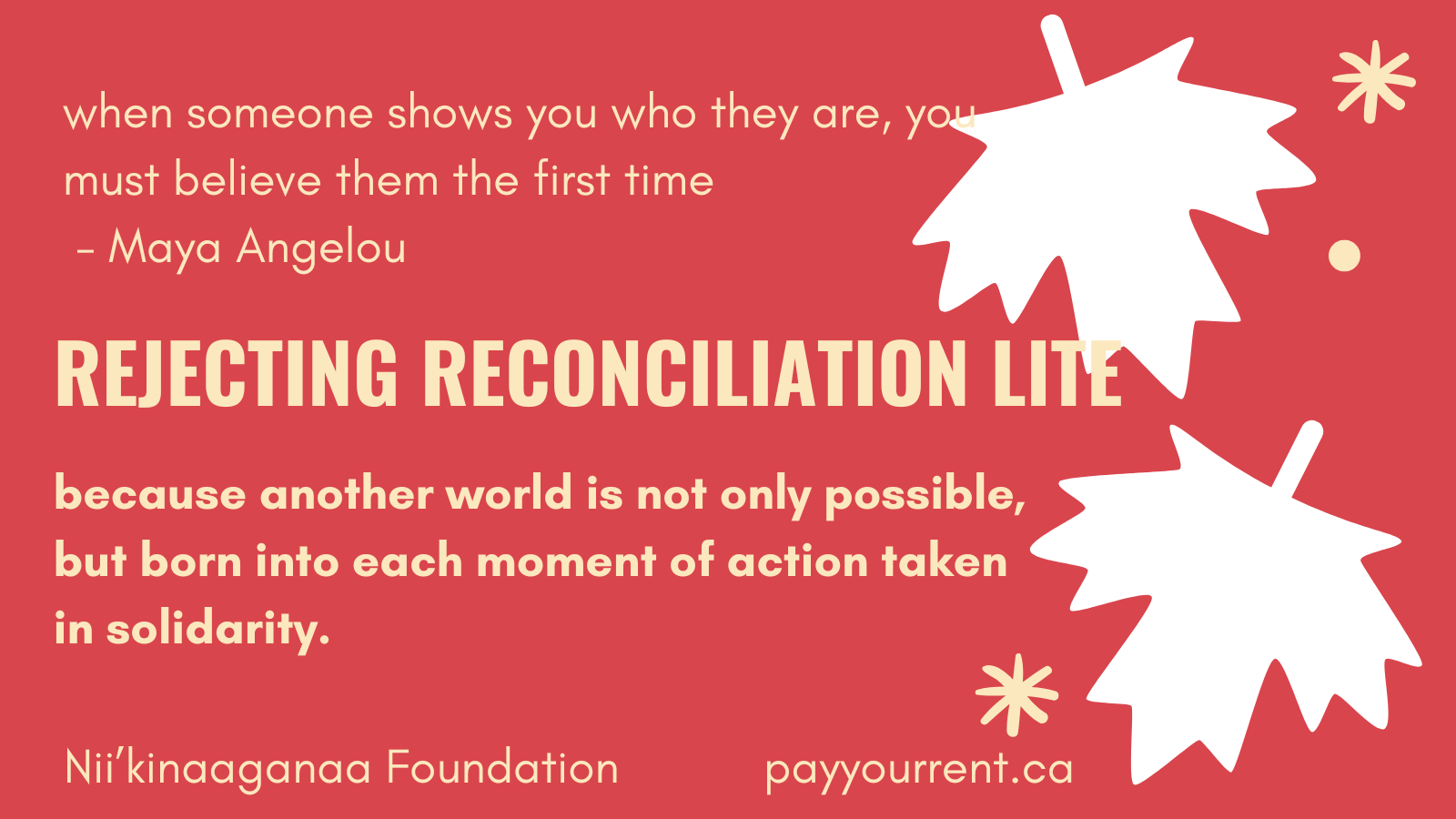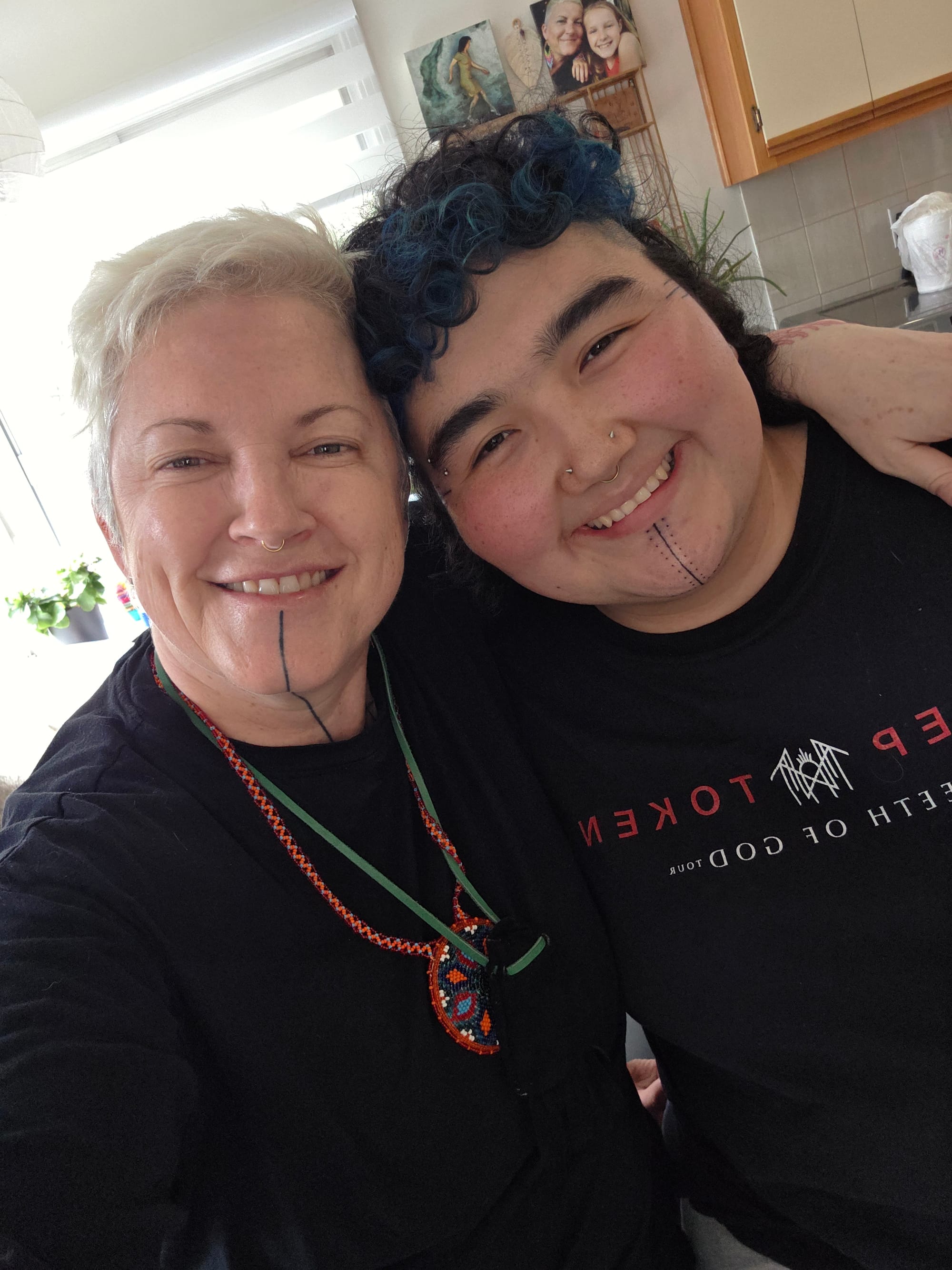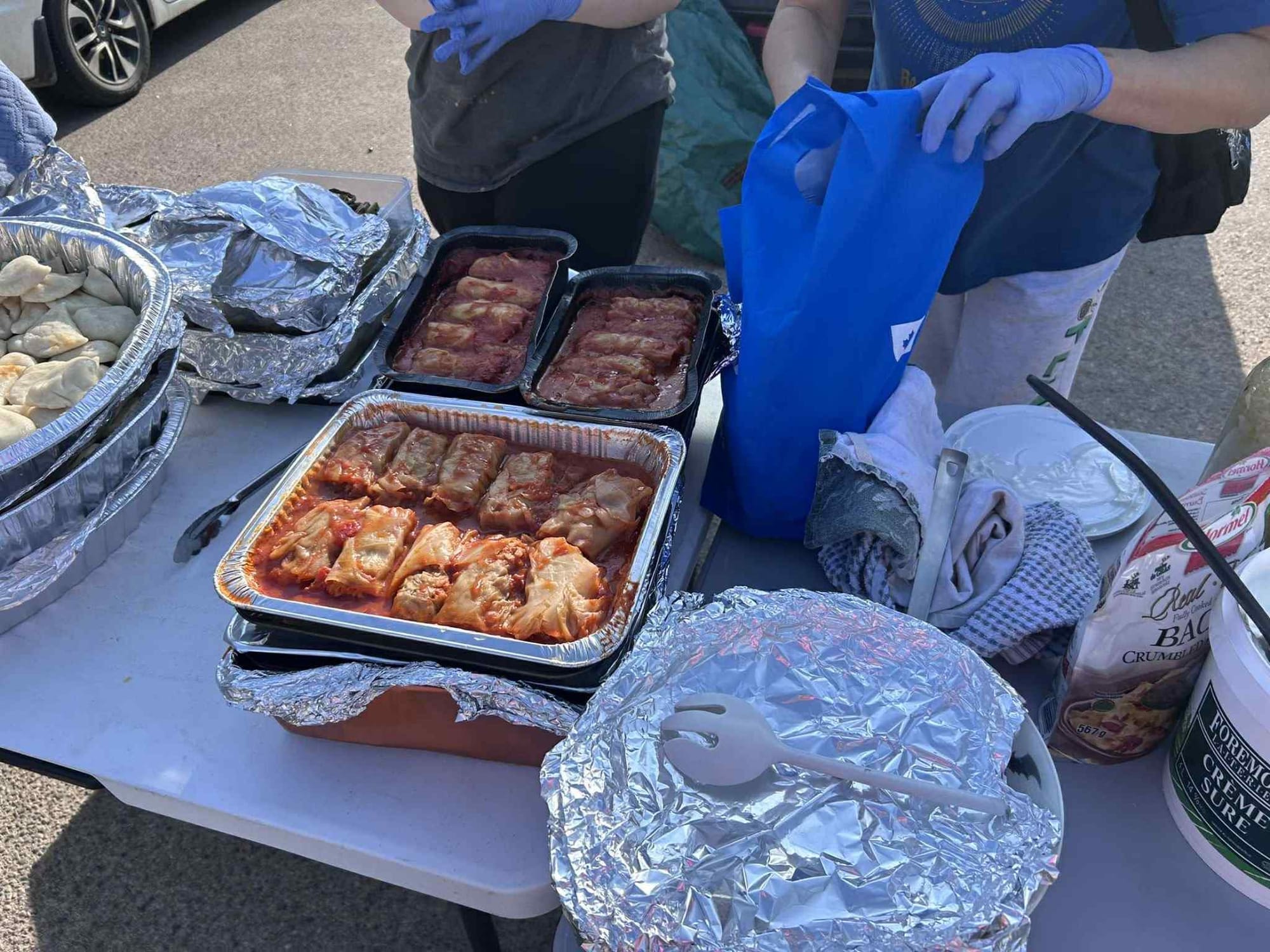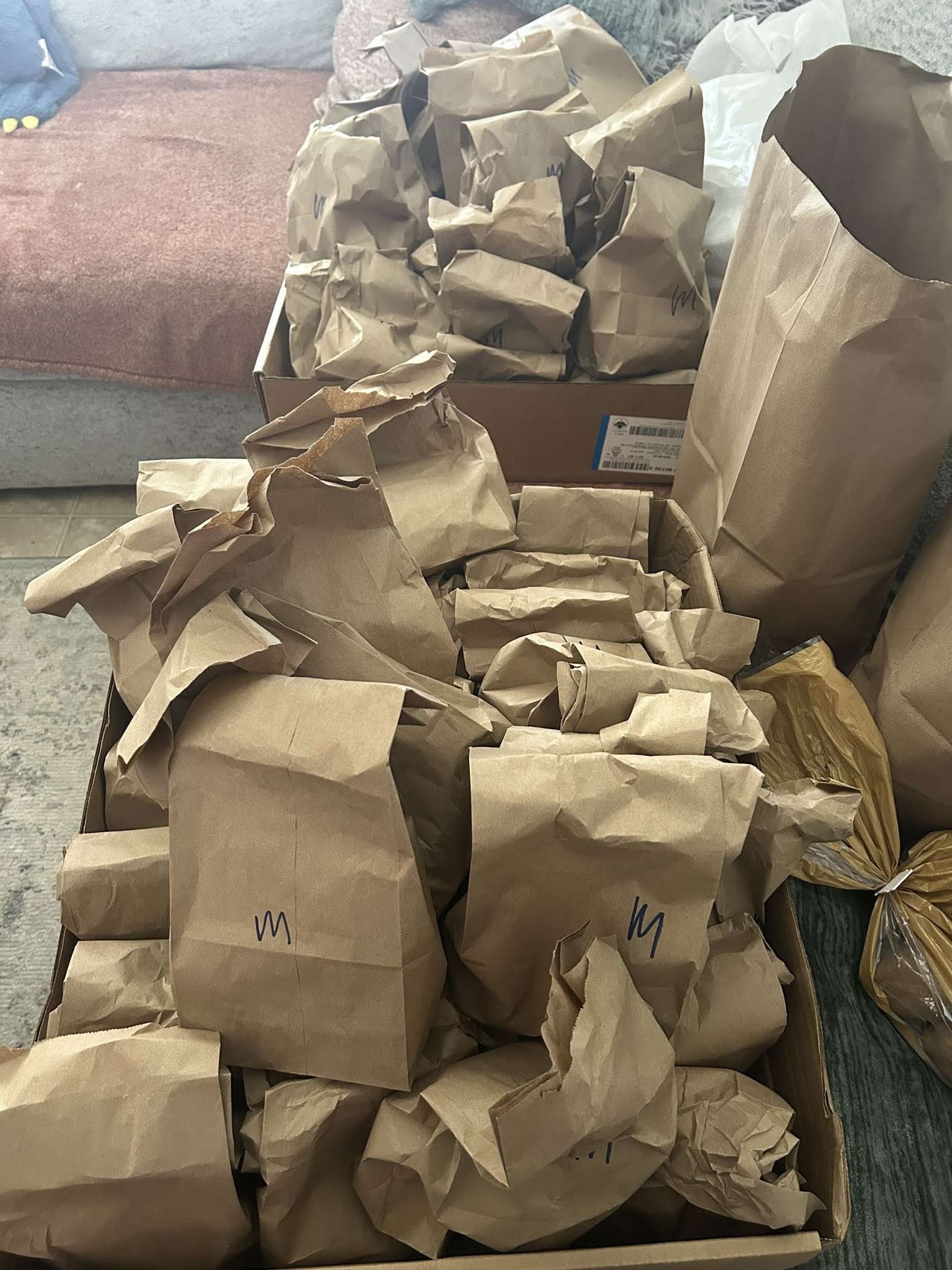Reconciliation Lite™

Forwarding this email, or posting it on social media along with some words about why you support us helps to expand our reach!
Ahhh, Summer.
School is out, heat waves have arrived on the wings of ice cream truck songs, and the just concluded National Indigenous History Month (NIHM) continues to play a crucial role in reminding us that the settler colonial government of Canada is only interested in Reconciliation Lite™: a watered-down version of relationship building that trades meaningful and life-saving action for recognition politics and performative allyship.
It’s been 10 years since the Truth and Reconciliation Commission (TRC) released its 94 Calls to Action. That means Canada has had roughly 120 months to facilitate land restitution, 523 weeks to implement justice reform, 3,665 days to address the inequities in the education and child welfare systems, 87,960 hours to recognize Indigenous rights and 5,277,600 minutes to bring clean drinking water (a right in itself) to every community—some who’ve been without it for 949,967,948 seconds (30 years).
In all that time, can you guess how many of the TRC’s Calls to Action have been completed?
15.
At this rate, all 94 won’t be completed until 2084. Do we think Neskantaga can go another 59 years without safe water? Do we think Indigenous people can weather six more decades of racist healthcare and policing systems? Does this sound like a country that’s truly invested in establishing and maintaining mutually respectful relationships with the original peoples of the land? A country that’s truly invested in healing?
When the prime minister says that NIHM is “a time to celebrate the histories, cultures, languages, knowledge, and traditions of First Nations, Inuit, and Métis Peoples” what he’s actually celebrating is that the colonial government is still in power and Reconciliation Lite™ is all that’s needed to keep the masses from demanding true justice. When he says “Indigenous leadership and perspectives will be foundational to how this government delivers its mandate” and claims to champion the idea of free, prior, and informed consent with regards to the risky resource thefts he's planning, he’s actually saying “look how easy it is to say one thing, while fast tracking a bill that will do the exact opposite and cause further harm to the entire country and its human and non-human inhabitants.”
Canada’s quarter-assed attempts at reconciliation are egregious for reasons that would take 100 newsletters to encapsulate. But it’s the promotion of such cowardly and blatantly anti-indigenous legislation (Bills 5 and C-5) in the pursuit of money that is truly appalling. It invalidates everything Canada has done in the name of reconciliation (as insubstantial as it may be) and proves that it’s actually not invested in it. AKA it’s all talk. Window dressing. Lip service. Whatever you want to call it, it’s an insult to our intelligence, almost “as though the point were to prove to [us] that [we] have no agency and shouldn't even try to do anything about it.” Who’d a thunk Mr. Goldman Sachs, who just pledged 5% of Canada's GDP to NATO, committed to an extra $9 billion in military spending, and just $15 million (max) for the 17,500 people across six First Nations communities displaced by Prairie wildfires would turn out to be a profits-over-people kinda guy?
Maya Angelou nailed it: when someone shows you who they are, you must believe them the first time. Yet time and time again, we have been shown that we can’t depend on colonial governments to implement real, systemic change because that would be antithetical to its agenda of pursuing capital at all costs. To put it another way—real reconciliation would be bad for business. In the words of Diné activist, Klee Benally:
Decolonial aspirations are stunted with liberal cosmetology if nothing concrete is done to address historical and ongoing anti-Indigenous brutality. This is an insidious conciliatory process of decolonial recuperation that is rooted in cultural and symbolic change primarily fixated on transforming social stature. It fails to meaningfully confront and transform social power.
Similarly, in his book “Red Skin, White Masks” Glen Coulthard, Yellowknives Dene, says:
In situations where colonial rule does not depend solely on the exercise of state violence, its reproduction instead rests on the ability to entice Indigenous peoples to identify, either implicitly or explicitly, with the profoundly asymmetrical and nonreciprocal forms of recognition either imposed on or granted to them by the settler state and society.
I understand that NIHM is in June because of the solstice, but it's laughable that as soon as it ends, it's "Canada" Day. It almost feels like a month of Reconciliation Lite™ is all that's needed to have parades and set off fireworks that ultimately celebrate genocide, land theft, residential school abuse, and all the other atrocities Canada has waged (and continues to wage) on the original peoples of this land. Imagine if all the time and resources devoted to Canada Day were re-routed to complete more of the TRC Calls to Action. I personally would not miss the environmentally and psychologically harmful fireworks/display of power.
The gaslight-coloured chasm between public celebration and meaningful political action (land back, for one) continues to illuminate the fact that Canada has always prioritized optics over outcomes, words over deeds, fanfare over what’s fair. No matter how well-intentioned, a month of recognition (I’m also thinking about the parallel of Pride here and the grotesque rainbow washing that accompanies it each June) will never be an appropriate substitute for concrete and tangible reconciliation. We can and we must celebrate Indigenous history and culture—but if that’s all we do, we’re not reconciling anything but our consciences (and falsely, at that).
So what are we to do with the political inaction that continues to harm an already marginalized and vulnerable population (and by extension, everyone)? We must collectively jump in between the “n” and the “a” of inaction to create a space where we can be in action together. This is the basis of mutual aid: neighbours helping neighbours through action. The first Pride Parade was a riot against police brutality—people not just reacting to the persecution of 2SLGBTQIA+ communities but acting against it in solidarity with their neighbours.
Similarly, right now there's an Indigenous-led encampment outside of Queen’s Park in Toronto that’s protesting Bill 5. There are several mutual aid initiatives operating on their behalf to provide them with essential supplies as they put their bodies on the line in protest of legislation that will harm the environment and ultimately put all our lives on the line. This is neighbours helping neighbours through action. Mutual aid is what allows us to show up for each other in the face of injustice so that we can build a better world together.
And with that, let’s meet two organizers we support who are helping to remind us that another world is not only possible, but born into each moment of action taken in solidarity.
Dr. Mel Lefebvre is a Two-Spirit Michif, Nehiyaw, French, Irish traditional tattoo practitioner, community worker, and First Peoples Studies professor at Concordia. Based in Tiotia:ke/Montreal, her practice is focused on ancestral skin marking as a mode of healing and reconnection for urban Indigenous people with a particular focus on 2SLGBTQIA+ and Indigenous women as well as reclaiming and imagining traditional gender-fluid tattoos in contemporary and future contexts.
An artist herself for most of her life, Dr. Mel began her tattoo work after receiving ancestral skin marking from an Indigenous artist. She identified it as another way to serve her community by merging her artistic practice and cultural protocols. On the significance of traditional tattooing for Indigenous peoples, she writes:
These markings are a reminder of our roles in and responsibilities to our communities; they help us to celebrate our achievements as well as mark our most challenging moments; they are holistic medicine and methodology that encompasses culture, belonging, identity, (re)connection, decolonization, sovereignty, empowerment, gender, transformation, and healing. This ancestral practice is a relationship to our ancestors, marks filled with intention that we wear as expressions of who we were, are, and will be as Indigenous peoples. There is power in these markings.
Traditional tattooing requires “slow time” to account for the ceremonial preparation and protocol before, during, and after the process—not to mention the intense energy it demands of both Dr. Mel and her collaborators. With the help of your donations, Dr. Mel is able to gift these sessions to community members who are unable to monetarily support the work. Reflecting on the impact this work has on her collaborators, she says:
They have expressed that skin marking medicine is profound and transformative. The conversations and emotions around these exchanges are life-giving with the process touching on struggles around grief and mourning of what has been lost—culture, identity, belonging—but ultimately, feelings of reconnection, strength, and celebration despite the colonial project.
And on what it means to be able to hold space and facilitate safe healing for the Indigenous 2SLGBTQIA+ community, she says:
It’s a massive honour for me to be able to provide this medicine to my 2S community. Trans, Two-Spirit, gender expansive folks desire and deserve belonging, to have our own markings and celebrate our existences in the past, present, and futures, in this realm and in all realms. This is a way for us to Return from the diasporas we experience: physical, emotional, mental and spiritual diasporas. We often retreat within the self to stay safe and this is one of the ways we can Return. Our ancestors recognize and welcome us through our markings.
When asked what kinds of actions people can take to address the ongoing issues faced by Indigenous communities, Dr. Mel said:
One of the biggest things allies can do is to put their bodies on the line, literally, for the land and for us, as Indigenous peoples have always done. When your bodies are at immediate risk, whether blockading to save the water, forest, air, or your children, you truly begin to know what's at stake.

Now over to Debbie Ironbow and the Blue Feather outreach team. We’ve featured Debbie in previous newsletters, but want to spotlight the work she’s been doing for Prairie wildfire evacuees. In Saskatoon, where Debbie is, over 15,000 people have been displaced. Her team has been working hard to provide as much support as they can, feeding over 300 people every weekend and providing food hampers and hygiene supplies to a community in desperate need of material and emotional support.
On top of that, Blue Feather is working on a community initiative surrounding education and reproductive justice for Indigenous women and training volunteers on how to administer Narcan in cases of toxic drug poisoning. And on top of THAT, they’ll also be in the Saskatoon Pride Parade this year, carrying a banner and signs communicating the history of oppression that created Pride. Debbie told us that Blue Feather is very much considered a safe space for 2SLGBTQIA+ in their community and have volunteers from that community that work alongside them—in action with them.
Which brings us to more meaningful actions people can take to help their neighbours survive the perennial and colonial injustices of what it means to be an Indigenous person in Canada. Debbie encourages us to go beyond donating:
Get to know us. We have people come out with us and learn first-hand who the community without shelter is. We show them that the propaganda is wrong and that the truth is much deeper and insidious. Give us your time. We know that the whole country is struggling, so learning, removing fear, and encouraging the relationship between those who have and those who have nothing is crucial. Our lives here are our resistance to powers we have no say in. The giving of time and the time to learn, those are two things we ask. We also ask for your respectful silence while you serve unless it’s a smile and a greeting. Far too often, the white nation doesn't know how to communicate with the people of our community and our community doesn't want to communicate with them on their terms—far too much trauma.


And on the topic of the devastating wildfires, Nii'kinaaganaa has been contacted by Fern Bedek: a trans author of LGBTQ+ fiction published through itch.io. Fern has organized a group of creators and set up a fundraiser for Indigenous communities affected by the wildfires. 100% of the content sales, from books to games and graphics, will be received by us and redirected to communities in need. Actions like these allow us to show up for our neighbours, strengthen the bonds of community, and shuttle us toward a future rooted in solidarity—something the government could learn from.
While Canada’s National Indigenous History Month website made a show of exploring the past and honouring Indigenous histories, it had nothing to say about Indigenous futures. This is a glaring indictment of the state’s inaction that we must transform into one more reason to join together in action on behalf of the original peoples of the land.
Pride Month taught us the power of protest (which applies to Pride itself, too) and not settling for symbolic recognition while real injustices persist. We must apply the same lesson to Indigenous rights. Until real reconciliation is achieved, National Indigenous History Month will come and go like an ice cream truck song: once the truck gets far enough away, we'll forget all about the song it was sharing with us.
From Turtle Island to Palestine, colonization is a crime.
Thanks for reading and supporting,
The Nii’kinaaganaa Team
“We will ceremony and laugh, dance, sing, drum, and love each other wildly and softly, and create whatever futures we desire.”
-Dr. Mel Lefebvre